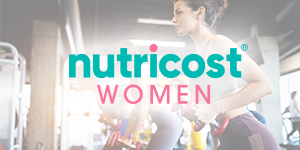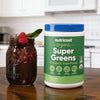Pregnant? Omega-3s Might be More Important Than You Think

When pregnant, there’s a lot to think about. You’re eating for two, and it can be a daunting task to make sure that both you and your baby are getting the nutrients you need.
So what does this have to do with omega-3s?
For starters, most women aren’t getting enough of them. Data suggests that the average American woman consumes about 60mg a day, well short of the recommended amount of 200mg. In fact, roughly 70% of women fall below this cut-point.
While pregnant, omega-3s are a critical building block of the fetal brain, eyes, and nervous system and appear to reduce the risk of preterm birth. And the benefits of omega-3s aren’t just for your child, but for you as well. Higher levels of omega-3s have also been associated with less severe postpartum depression and an overall healthier mood in new mothers.
What are Omega-3s Anyway?
Omega-3s are a family of long-chain, unsaturated fatty acids which are essential nutrients for health and development. The human body does not produce omega-3s on its own, meaning that they must be obtained from diet or supplementation.

There are three main types of omega-3s which you should know about:
- Alpha-linolenic acid (ALA)
- Eicosapentaenoic acid (EPA)
- Docosahexaenoic acid (DHA)
Research indicates that the two most beneficial omega-3s are EPA and DHA. EPA supports the heart, immune system, and inflammatory response. DHA supports the brain, eyes, and central nervous system, which is why it is uniquely important for pregnant and lactating women.
How Can Omega-3s Assist Your Pregnancy?
Women in the United States consume low levels of omega-3 fatty acids. Even though they are beneficial, pregnant women often avoid natural sources like fish because of concerns about potential mercury contamination.
This dietary pattern is associated with poor health outcomes. Likewise, getting enough omega-3s can lead to better outcomes for both the mother and the child.
Lower Risk of Preterm Birth
A preterm birth is one which occurs before the start of the 37th week of pregnancy. Over the last 20 years, preterm birth rates have risen in almost every country. Preterm birth increases the risk of both short and long-term complications including respiratory problems, brain problems, and chronic health issues (among many others).

Research has shown a correlation between higher levels of DHA and EPA and a significantly reduced risk of preterm birth. In fact, this benefit was first recognized when researchers noticed that preterm births were less common among women living near the sea where fish made up a larger proportion of the diet.
Optimal Infant Development
An infant’s brain undergoes the greatest development during the third trimester of pregnancy. Research seems to suggest that proper omega-3 intake (at least 8 ounces of fish per week) is associated with better infant health outcomes.
For example, one study which sampled 341 mother-child pairs observed that “fish consumption more than twice per week compared to no weekly consumption was associated with improved visual motor skills in their children at age 3.”
Another study found a correlation between lower seafood consumption and an increased risk of suboptimal communication skills in the children between the ages of 6-18 months. Suboptimal IQ and social skills were also observed at ages 7-8.
Reduced Risk of Postpartum Depression
Postpartum depression affects between 11 and 20 percent of all mothers. Many of these decide against medication for fear of potential side effects on their child. So what to do?

For some women, omega-3s may provide an answer. One cross-national analysis indicated that higher fish consumption correlated with a lower incidence of postpartum depression. Another study found an omega-3 supplement to be a superior antidepressant when compared against a placebo.
Why does this work? Researchers aren’t quite sure, but observational studies do seem to suggest that higher levels of omega-3 intake are associated with lower levels of postpartum depression.
Where Can I Get My Omega-3s?
If you’re pregnant, the best place to get your omega-3s is from fish. You may have heard that other foods such as flaxseed oil or chia seeds have high levels of omega-3s, but those are largely made up of ALA. What you need is DHA and EPA rich foods.
- Salmon
- Herring
- Sardines
- Mackerel
- Trout
If you’re concerned about mercury in your fish, be sure to research the brands you purchase to see if they are known for abnormal levels of mercury. However, on the whole, these fishes will not have significant amounts of mercury in them.

Instead, look out for shark, ray, swordfish, and the southern bluefin tuna, all of which contain higher levels of mercury. However, chances are the only of those fish you’ll have to worry about is the southern bluefin tuna.
Recap
Omega-3s are a type of fatty acid most commonly found in fish which can benefit pregnant or nursing women and their children.
These benefits include reducing the risk of premature birth, promoting child development, and lowering the risk of postpartum depression.
Though found in fish, not everyone likes the taste of fish. Fish can also be relatively expensive. If for either of these reasons or any other, it is difficult for you to meet the 200mg recommended intake for omega-3 fatty acids, you may want to consider a supplement.
Sources
https://pubmed.ncbi.nlm.nih.gov/20974414/
https://ods.od.nih.gov/factsheets/Omega3FattyAcids-HealthProfessional/
https://pubmed.ncbi.nlm.nih.gov/12509593/
https://www.nature.com/articles/s41398-020-00886-3
https://www.ncbi.nlm.nih.gov/pmc/articles/PMC2989696/
https://www.ncbi.nlm.nih.gov/pmc/articles/PMC6316227/
https://www.mayoclinic.org/diseases-conditions/premature-birth/symptoms-causes/syc-20376730









